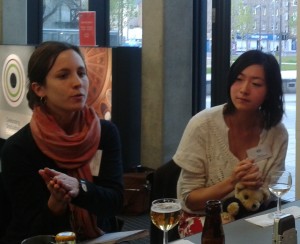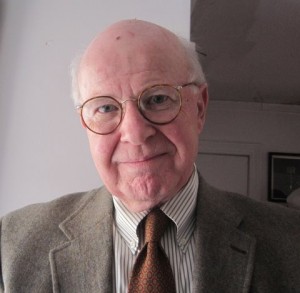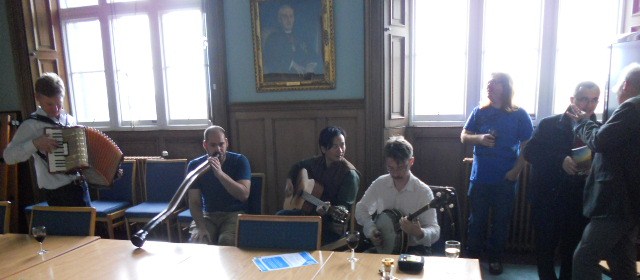Roundtable: Critics or Caretakers?
Here we are with yet another roundtable for you, following on from our epic compilation episode where world-famous academics answered the question, ‘Should Scholars of Religion be Critics or Caretakers?’ This discussion brings together a number of aspiring academics to reflect on some of the issues brought up in that podcast in a friendly and hilarious manner. The question cuts to the core of what academics who study religion are doing... are they taking care of religion? Are they antagonising it? What should they be doing? And judging by the various long tangents through which discussion meanders, the question certainly sparked our interest.
The participants were Katie Aston, Anna Clot i Garrell, Christopher Cotter, Ting Guo, Ethan Quillen, David Robertson and Jonathan Tuckett (biographical statements below). All of us had listened to the bulk of the podcast mentioned above... BUT none of us had yet heard Russell McCutcheon’s response to it (so, apologies that we probably fall afoul of his excellent critique).
If you are new to the podcast – this is not what we usually do. If you are a regular listener – you might enjoy this, or you might not. We hope you pick the former...
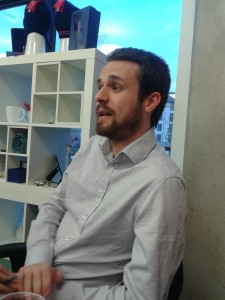
Discussion flows through what an academic ‘caretaker’ would look like, to whether we are being caretakers of the academic discipline of Religious Studies simply by perpetuating the discussion of religion. We discuss the nature of the ‘sacred’, the idea of ‘critical religion’, and get in to talking about ‘cultural Christians’, the ‘spiritual but not religious’ and the age-old problem of defining religion... and the newer but semantically parasitic problem of defining ‘nonreligion’.
We debate and attempt to answer such questions as:
- If our research uncovers material which is relevant to the real world… make sure that people know? Should we be public intellectuals?
- Should we just tell the truth no matter what the consequence?
- Does this discussion depend on which definition of ‘religion’ we work with?
- Where would we draw the line between being a scientific academic, and taking action against the conduct of a group we are studying?
- Are ‘we’ in a position to judge? Would we be judging from intellectual grounds or ethical grounds?
- Anna: What is the nature of academic criticism, as opposed to criticism in the common parlance?
- Should we be methodologically atheist? Methodologically agnostic? Are these the same thing?
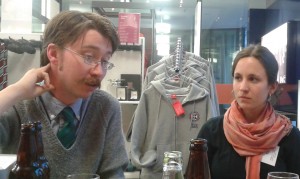
We should warn you that this is a little rough around the edges. The idea was not to present anyone with a sophisticated discussion, but to give you an idea of the vast amount of issues which a simple question can raise, and encourage others to have such discussions themselves and maybe come to different conclusions. It’s uncensored... it’s fun... we had a good time. Please don’t take anything too seriously... but try to enjoy it, to engage with us, to disagree with us, to criticise us. That’s what we’re here for. There is also a lot of discussion of paedophilia... this came up early on as a hypothetically abhorrent practice which some ‘religious’ group might engage in. As it is pretty difficult to trump this in terms of abhorrence we returned to the issue somewhat more regularly than it warranted. Suffice to say, this was most definitely a hypothetical example.
This podcast was recorded in Chris’ place of gainful employment – the University of Edinburgh Visitor Centre – and we are very grateful to them for providing the space. The participants were also all brought together by the Religion & Society Programme’s ‘Sacred Practice of Everyday Life’ conference, and we were very grateful to Linda Woodhead and the other organisers for allowing the Religious Studies Project to attend and record a number of podcasts with participants (to be released from September 2012).
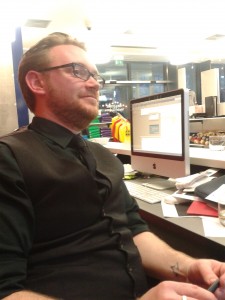
Some choice quotations:
Ethan: “so, essentially what you’re promoting is that we all need to be defence attorneys?”
Chris: “Are we as scholars of religion by the very fact that we are scholars of religion... being caretakers?”
Katie: “Can I just clarify that I’m not a scholar of religion? Coz I’m not...”
Ethan: “That’s like saying it’s raining outside, this umbrella isn’t working, so I’ll open this canopy instead.”
And just so that we have a ‘proper’ academic involved, here is the quotation from Donald Wiebe which Chris cites in the recording as an example of the ‘critic’ side of the dichotomy:
“Just as the knowledge produced in the humanities and by social scientists may bear on human problems and public concerns, so also the knowledge produced by students of religion may bear the same relationship to such issues. In this regard, however, it is important to note: first, that the “linkage” between the knowledge produced and the problems resolved is “external,” that is, it is of the same order, so to speak, as that between the natural sciences and engineering; second, that even though religious studies research may be relevant in that fashion, working out the policy/resolution implications of that knowledge is not the task of the student of religion. To take on that assignment is the task of policy makers, politicians, therapists, conflict managers, and other “public intellectuals.” And it is important, I think, that the scientific character of the study of religion not be compromised in any way by bringing such tasks in to the purview of Religious Studies”
Wiebe, Donald 2008. ‘The Scientific Study of Religion and Its Cultured Despisers’ in Willi Braun and Russell McCutcheon (eds.), Introducing Religion: Essays in Honor of Jonathan Z. Smith. London: Equinox, p. 477.
The Participants:
 Having completed a BA (hons) in Fine Art at Wimbledon School of Art in 2006, Katie Aston went on to complete her Masters in Social Anthropology at Goldsmiths University, with a dissertation investigating gender performance within contemporary Stand Up comedy in London. Building on a pilot study of the Atheist Bus Campaign, she is currently undertaking an ethnographic study of non-religious value construction and material cultures. She is looking specifically at rationalism and the role Christian heritage within non-religious individuals and organisation, taking a historical perspective from the freethought archives of Bishopsgate Institute. Katie is an Assistant Editor at NSRN Online, the web presence of the Nonreligion and Secularity Research Network.
Having completed a BA (hons) in Fine Art at Wimbledon School of Art in 2006, Katie Aston went on to complete her Masters in Social Anthropology at Goldsmiths University, with a dissertation investigating gender performance within contemporary Stand Up comedy in London. Building on a pilot study of the Atheist Bus Campaign, she is currently undertaking an ethnographic study of non-religious value construction and material cultures. She is looking specifically at rationalism and the role Christian heritage within non-religious individuals and organisation, taking a historical perspective from the freethought archives of Bishopsgate Institute. Katie is an Assistant Editor at NSRN Online, the web presence of the Nonreligion and Secularity Research Network.
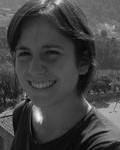 Anna Clot i Garrell is currently a PhD candidate in the Universitat Autònoma de Barcelona (UAB). She received her degree in Sociology from Universitat Autònoma de Barcelona in 2010. In 2009, she became part of the research group ISOR (Investigations in Sociology of Religion) directed by Dr. Joan Estruch, collaborating in the research project Evangelical Churches in Barcelona: doctrinal heterogeneity, immigration and evangelization strategies directed by Dra Maria del Mar Griera. In 2011, she completed a Master of Arts in Religious Studies at Lancaster University and was awarded with the Ninian Smart prize for the best dissertation in Religious Studies for the dissertation Exploring New Religious Expressions in Catalunya supervised by Dr. Andrew Dawson. She is interested in the transformations of religion and the emergence of novel expressions of religiosity in the secular sphere and traditional religious contexts.
Anna Clot i Garrell is currently a PhD candidate in the Universitat Autònoma de Barcelona (UAB). She received her degree in Sociology from Universitat Autònoma de Barcelona in 2010. In 2009, she became part of the research group ISOR (Investigations in Sociology of Religion) directed by Dr. Joan Estruch, collaborating in the research project Evangelical Churches in Barcelona: doctrinal heterogeneity, immigration and evangelization strategies directed by Dra Maria del Mar Griera. In 2011, she completed a Master of Arts in Religious Studies at Lancaster University and was awarded with the Ninian Smart prize for the best dissertation in Religious Studies for the dissertation Exploring New Religious Expressions in Catalunya supervised by Dr. Andrew Dawson. She is interested in the transformations of religion and the emergence of novel expressions of religiosity in the secular sphere and traditional religious contexts.
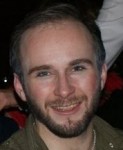 Christopher R. Cotter recently completed his MSc by Research in Religious Studies at the University of Edinburgh, on the topic ‘Toward a Typology of Nonreligion: A Qualitative Analysis of Everyday Narratives of Scottish University Students’. He is currently taking a year out from study to present at conferences, complete various writing projects, and work on projects such as this. His PhD research at Lancaster University (commencing October 2012) will continue to expand the theme of ‘non-religion’ to apply to ‘everyone’ in religiously diverse, socio-economically deprived urban environments, simultaneously deconstructing the religion-nonreligion dichotomy in the process. He is Deputy Editor and Bibliography Manager at the Nonreligion and Secularity Research Network, and currently editing the volume ‘Social Identities between the Sacred and the Secular’ with Abby Day and Giselle Vincett (Ashgate, 2013). See his personal blog, or academia.edu page for a full CV.
Christopher R. Cotter recently completed his MSc by Research in Religious Studies at the University of Edinburgh, on the topic ‘Toward a Typology of Nonreligion: A Qualitative Analysis of Everyday Narratives of Scottish University Students’. He is currently taking a year out from study to present at conferences, complete various writing projects, and work on projects such as this. His PhD research at Lancaster University (commencing October 2012) will continue to expand the theme of ‘non-religion’ to apply to ‘everyone’ in religiously diverse, socio-economically deprived urban environments, simultaneously deconstructing the religion-nonreligion dichotomy in the process. He is Deputy Editor and Bibliography Manager at the Nonreligion and Secularity Research Network, and currently editing the volume ‘Social Identities between the Sacred and the Secular’ with Abby Day and Giselle Vincett (Ashgate, 2013). See his personal blog, or academia.edu page for a full CV.
Normal
0
false
false
false
EN-GB
X-NONE
X-NONE
/* Style Definitions */
table.MsoNormalTable
{mso-style-name:"Table Normal";
mso-tstyle-rowband-size:0;
mso-tstyle-colband-size:0;
mso-style-noshow:yes;
mso-style-priority:99;
mso-style-qformat:yes;
mso-style-parent:"";
mso-padding-alt:0cm 5.4pt 0cm 5.4pt;
mso-para-margin:0cm;
mso-para-margin-bottom:.0001pt;
mso-pagination:widow-orphan;
font-size:11.0pt;
font-family:"Calibri","sans-serif";
mso-ascii-font-family:Calibri;
mso-ascii-theme-font:minor-latin;
mso-fareast-font-family:"Times New Roman";
mso-fareast-theme-font:minor-fareast;
mso-hansi-font-family:Calibri;
mso-hansi-theme-font:minor-latin;
mso-bidi-font-family:"Times New Roman";
mso-bidi-theme-font:minor-bidi;}
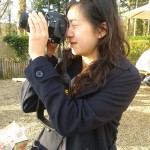 Ting Guo is a PhD candidate in religious studies at the University of Edinburgh. Her thesis is on the philosophy of artificial intelligence and how that might contribute to understanding the meaning of spirituality and who and what we are in the Information Age. She is also interested in the religious landscape in East and Southeast Asia, in particular the phenomenon of "underground church" in China, the notion of neo-colonialism, and Chinese diaspora in Britain.
Ting Guo is a PhD candidate in religious studies at the University of Edinburgh. Her thesis is on the philosophy of artificial intelligence and how that might contribute to understanding the meaning of spirituality and who and what we are in the Information Age. She is also interested in the religious landscape in East and Southeast Asia, in particular the phenomenon of "underground church" in China, the notion of neo-colonialism, and Chinese diaspora in Britain.
 Circular Academia: Navigating the Dangerous Waters of Term Re-Assignment for the Religious Studies Project.
Circular Academia: Navigating the Dangerous Waters of Term Re-Assignment for the Religious Studies Project.
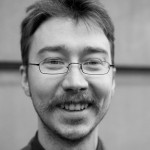 David G. Robertson is a Ph.D. candidate in the Religious Studies department of the University of Edinburgh. His research examines how UFO narratives became the bridge by which ideas crossed between the conspiracist and New Age milieus in the post-Cold War period. More broadly, his work concerns contemporary alternative spiritualities, and their relationship with popular culture. Forthcoming publications: “Making the Donkey Visible: Discordianism in the Works of Robert Anton Wilson” in C. Cusack & A. Norman (Eds.), Brill Handbook of New Religions and Cultural Production. Leiden: Brill (2012) “(Always) Living in the End Times: The “rolling prophecy” of the conspracist milieu” in When Prophecy Persists. London: INFORM/Ashgate (2012). For a full CV and my MSc thesis on contemporary gnosticism, see my Academia page or my personal blog.
David G. Robertson is a Ph.D. candidate in the Religious Studies department of the University of Edinburgh. His research examines how UFO narratives became the bridge by which ideas crossed between the conspiracist and New Age milieus in the post-Cold War period. More broadly, his work concerns contemporary alternative spiritualities, and their relationship with popular culture. Forthcoming publications: “Making the Donkey Visible: Discordianism in the Works of Robert Anton Wilson” in C. Cusack & A. Norman (Eds.), Brill Handbook of New Religions and Cultural Production. Leiden: Brill (2012) “(Always) Living in the End Times: The “rolling prophecy” of the conspracist milieu” in When Prophecy Persists. London: INFORM/Ashgate (2012). For a full CV and my MSc thesis on contemporary gnosticism, see my Academia page or my personal blog.
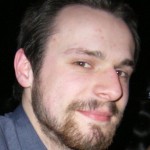 What is Phenomenology? for the Religious Studies Project, as well as recording a number of interviews.
What is Phenomenology? for the Religious Studies Project, as well as recording a number of interviews.
Editors’ Picks 1: Losing Religion
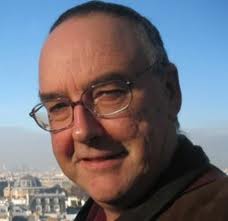 In this, the first of four summer break Editor's Picks "repodcasts", Louise Connelly reintroduces Chris's interview with Callum Brown, first broadcast on 30/4/2012. How can we use historical approaches in the study of religion? More specifically, can we use historical approaches to understand why people are losing it? Professor Callum Brown tells us why historical approaches have much to tell us about religious change. You can also download this interview, and subscribe to receive our weekly podcast, on Should Religious Studies be Multidisciplinary?
In this, the first of four summer break Editor's Picks "repodcasts", Louise Connelly reintroduces Chris's interview with Callum Brown, first broadcast on 30/4/2012. How can we use historical approaches in the study of religion? More specifically, can we use historical approaches to understand why people are losing it? Professor Callum Brown tells us why historical approaches have much to tell us about religious change. You can also download this interview, and subscribe to receive our weekly podcast, on Should Religious Studies be Multidisciplinary?
Editors’ Picks 2: The Phenomenology of Religion
The second of our Editors' Picks "repodcasts", and this time Jonathan has chosen our interview with James Cox on the Phenomenology of Religion. It was, incidentally, also our very first podcast, originally broadcast on the 14th of January, 2012. Jonathan also wrote the response to this interview, entitled “What is Phenomenology?“.
Phenomenology is an important methodology in the study of religions, but can be inaccessible to the student. In this interview, James Cox outlines the phenomenology of religion to David in a clear, concise way, avoiding jargon and placing the methodology in the broader context of the history of European philosophy and comparative religion.
You can also download this interview, and subscribe to receive our weekly podcast, on iTunes.
A transcription of this interview is also available as a PDF, and has been pasted on the page where the podcast was originally posted, along with some further information. All transcriptions are currently produced by volunteers. If you spot any errors in this transcription, please let us know at editors@religiousstudiesproject.com. If you would be willing to help with these efforts, or know of any sources of funding for the broader transcription project, please get in touch. Thanks for reading.
Editors’ Picks 3: Jay Demerath on Functionalist Religion and the Substantive Sacred
Week three of our Editors' Picks. Chris tells us why he (and his fiancée) liked Jay Demerath's interview on substantive and functionalist definitions of religion.
Could the difficulties associated with the academic conceptualisation of “religion” be overcome by changing our focus instead to “the sacred”? Jay Demerath tells Chris why we should define religion substantively – that is, in terms of specific attributes like rituals, deities or dogmas - but the sacred in terms of the function it serves in the lives of individuals and cultures. From this perspective, religion can be considered one of a number of potential sources of the sacred.
You can also download this interview, and subscribe to receive our weekly podcast, on iTunes. Please take a moment to rate us while you're there.
Jay Demerath is currently the Emile Durkheim Distinguished Professor of Sociology Emeritus at the University of Massachusetts, Amherst, where he has been a faculty member since 1972, including ten years as Chair. Prior to UMass, he received a 1958 A.B. from Harvard and a 1964 Ph.D from the U. Of California, Berkeley before rising from Instructor to Professor at the University of Wisconsin, Madison and serving as Executive Officer of the American Sociological Association. Among his many publications, he is author or editor of fourteen books, including the award-winning Crossing the Gods: World Religions and Worldly Politics (2001) and the recent Sage Handbook for the Sociology of Religion (2008). The current Chair-elect of the Religion Section of the American Sociological Association, he is also past-President of the Eastern Sociological Society, the Society for the Scientific Study of Religion, and the Association for the Sociology of Religion.
Of particular relevance to this interview is his paper from 2000, The Varieties of Sacred Experience: Finding the Sacred in a Secular Grove, from the Journal for the Scientific Study of Religion, 39, p. 1–11. Here’s the abstract:
This paper contends that the social scientific study of religion has long labored under a chafing constraint and a misleading premise. It suggests that our primary focus should be on the sacred, and that religion is just one among many possible sources of the sacred. Defining religion “substantively” but the sacred “functionally” helps toresolve a long-standing tension in the field. Broadened conceptions of the sacred and of “sacralization” help to defuse the conflict among the two very different versions of secularization theory: the “all-or-nothing” versus the “middle range.” Meanwhile, a conceptual typology of the sacred pivots around the intersections of two distinctions (compensatory vs. confirmatory and marginal vs. institutional). This generates four distinct scenarios: the sacred as integrative, the sacred as quest, the sacred as collectivity, and the sacred as counter-culture. The paper concludes with three admonitions for research in the area.
Editors’ Picks 4: The Secularisation Thesis
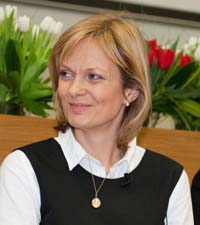 In this, the penultimate Editors' Pick, David tells us why he chose his interview with Linda Woodhead on the Secularisation thesis as his favourite.
In this, the penultimate Editors' Pick, David tells us why he chose his interview with Linda Woodhead on the Secularisation thesis as his favourite.
The secularisation thesis – the idea that traditional religions are in terminal decline in the industrialised world – was perhaps the central debate in the sociology of religion in the second half of the 20th century. Scholars such as Steve Bruce, Rodney Stark and Charles Taylor argued whether religion was becoming less important to individuals, or that only the authority of religions in the public sphere was declining. Data from the US and South America, however, began to challenge many of their basic assumptions. Professor Linda Woodhead joins us to discuss the background and legacy of the secularisation thesis.
You can also download this interview, and subscribe to receive our weekly podcast, on iTunes.
A transcription of this interview is also available as a PDF, and has been pasted below the original posting of this podcast. All transcriptions are currently produced by volunteers. If you spot any errors in this transcription, please let us know at editors@religiousstudiesproject.com. If you would be willing to help with these efforts, or know of any sources of funding for the broader transcription project, please get in touch. Thanks for reading.
Roundtable: Building an Academic Career
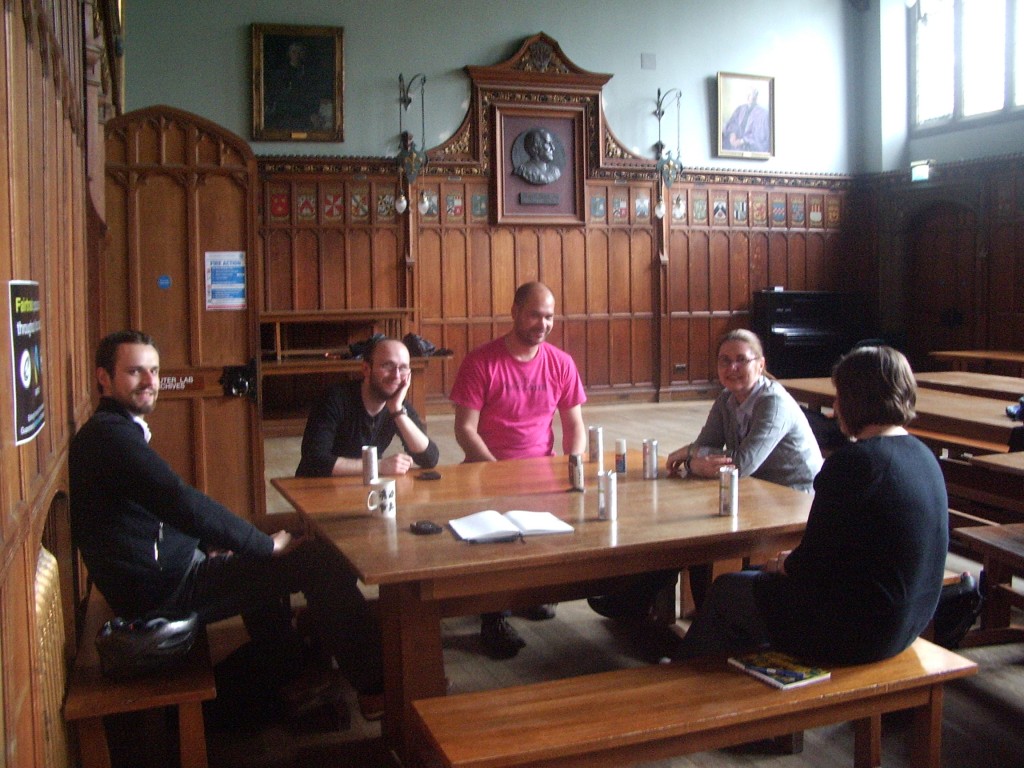
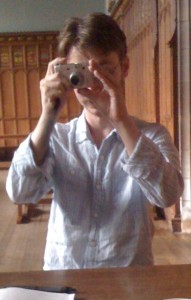
During her recent trip to the UK, the Religious Studies Project managed (with the promise of copious Pink Gin) to persuade Professor Carole Cusack to take part in a roundtable discussion. She suggested that we discuss how to build an academic career - advice which she has been generous with to many people in the past. That having been agreed, we rounded up a few of our regular discussants - and, for the first time, Louise Connelly, our hitherto silent third partner - in the imposing setting of the University of Edinburgh's Rainy Hall. We think we managed to produce something which should be of at least some use to any aspiring academic in the social sciences... we'd love to hear if you think so too!
David: “Don’t wait to be given permission… if it is interesting, it will work!”
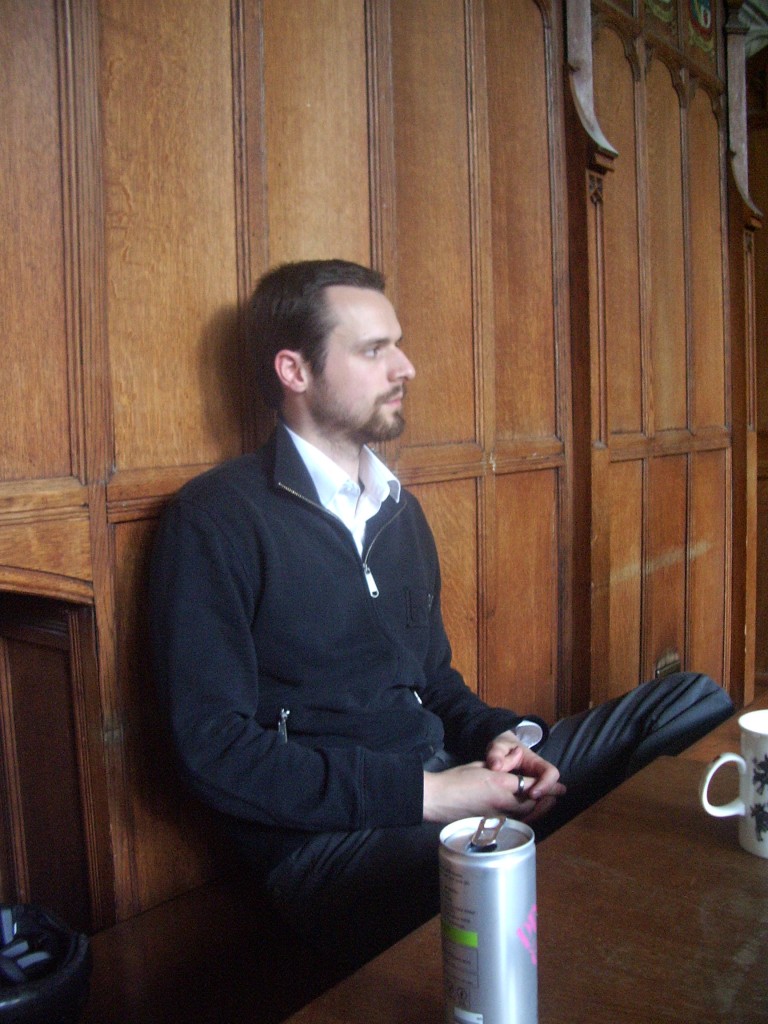 In these financially hard times, the role of the academic is changing; the reasons for people going to university are changing; and universities are constantly changing the configuration of their departments. Topics covered in this discussion include:
In these financially hard times, the role of the academic is changing; the reasons for people going to university are changing; and universities are constantly changing the configuration of their departments. Topics covered in this discussion include:
- the importance of publication, and the relative merits of different publications;
- getting teaching experience;
- services to the discipline and the community
- conferences and networking (Chris Cotter, of course)
- what to put in your CV
- how to keep up-to-date with your field
- and much more...
It is worth mentioning, of course, that this is all just advice and should be taken as such. The experience of others may be entirely different and we cannot, of course, be held responsible for any unforeseen consequences of following the advice contained herein.
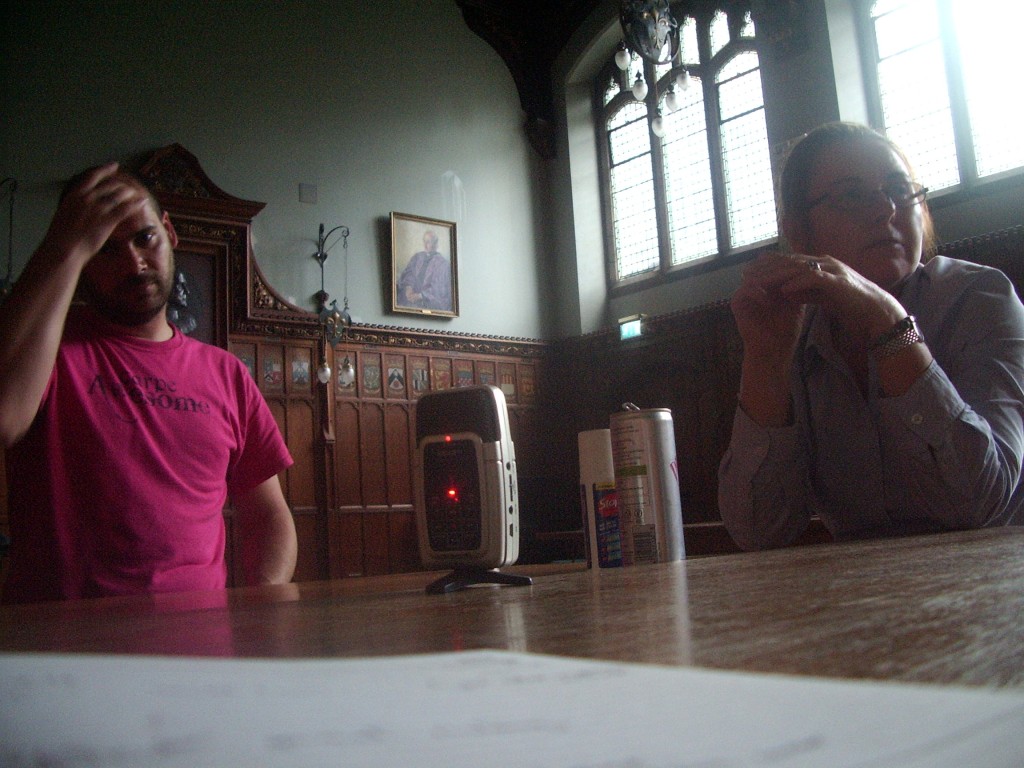
Links mentioned in the podcast (likely not comprehensive):
- Thesis Whisperer
- REF/RAE (UK)
- ERA (Australia)
- Brill Handbook of New Religions and Cultural Production
- "Tylor and Neo-Tylorian Approaches to the Study of Religion: Re-Evaluating an Important Lineage in the Theorisation of Religion" by Liam Sutherland (Paranthropology)
- Google Scholar
- Academia.edu
- Religious Studies Project Facebook Page
- Religious Studies Project Twitter
- Zetoc
- Journal of Religious History
- International Journal for the Study of New Religions
Carole: “You can’t double-dip: [if] you put something into research [on your CV], it doesn’t go somewhere else”
Participants:
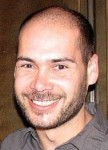 “Roundtable Regular” Kevin Whitesides completed his B.A. in Religious Studies at Humboldt State University. He has recently completed an MSc dissertation at the University of Edinburgh on ’2012′ millennialism as part of a broader emphasis on countercultural transmission. Kevin has contributed articles to ‘Archaeoastronomy’ and ‘Zeitschrift fur Anomalistik’, has contributed chapters for two anthologies on apocalypse and prophecy, and has presented widely on the ’2012′ milieu at academic conferences and universities.
“Roundtable Regular” Kevin Whitesides completed his B.A. in Religious Studies at Humboldt State University. He has recently completed an MSc dissertation at the University of Edinburgh on ’2012′ millennialism as part of a broader emphasis on countercultural transmission. Kevin has contributed articles to ‘Archaeoastronomy’ and ‘Zeitschrift fur Anomalistik’, has contributed chapters for two anthologies on apocalypse and prophecy, and has presented widely on the ’2012′ milieu at academic conferences and universities.
 What is Phenomenology? for the Religious Studies Project.
What is Phenomenology? for the Religious Studies Project.
 David G. Robertson is a Ph.D. candidate in the Religious Studies department of the University of Edinburgh. His research examines how UFO narratives became the bridge by which ideas crossed between the conspiracist and New Age milieus in the post-Cold War period. More broadly, his work concerns contemporary alternative spiritualities, and their relationship with popular culture. Forthcoming publications: “Making the Donkey Visible: Discordianism in the Works of Robert Anton Wilson” in C. Cusack & A. Norman (Eds.), Brill Handbook of New Religions and Cultural Production. Leiden: Brill (2012) “(Always) Living in the End Times: The “rolling prophecy” of the conspracist milieu” in When Prophecy Persists. London: INFORM/Ashgate (2012). For a full CV and my MSc thesis on contemporary gnosticism, see my Academia page or my personal blog.
David G. Robertson is a Ph.D. candidate in the Religious Studies department of the University of Edinburgh. His research examines how UFO narratives became the bridge by which ideas crossed between the conspiracist and New Age milieus in the post-Cold War period. More broadly, his work concerns contemporary alternative spiritualities, and their relationship with popular culture. Forthcoming publications: “Making the Donkey Visible: Discordianism in the Works of Robert Anton Wilson” in C. Cusack & A. Norman (Eds.), Brill Handbook of New Religions and Cultural Production. Leiden: Brill (2012) “(Always) Living in the End Times: The “rolling prophecy” of the conspracist milieu” in When Prophecy Persists. London: INFORM/Ashgate (2012). For a full CV and my MSc thesis on contemporary gnosticism, see my Academia page or my personal blog.
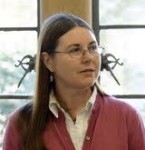 Carole M. Cusack (Associate Professor in Studies in Religion at the University of Sydney) trained as a medievalist and her doctorate was published as Conversion Among the Germanic Peoples (Cassell, 1998). Since the late 1990s she has taught in contemporary religious trends, publishing on pilgrimage and tourism, modern Pagan religions, new religious movements, the interface between religion and politics, and religion and popular culture. She is the author of The Essence of Buddhism (Lansdowne, 2001), Invented Religions: Imagination, Fiction and Faith (Ashgate, 2010), and The Sacred Tree: Ancient and Medieval Manifestations (Cambridge Scholars Publishing), 2011. She has published in a number of edited volumes, and is the editor (with Christopher Hartney) of Religion and Retributive Logic: Essays in Honour of Garry W. Trompf (Brill, 2010). With Christopher Hartney (University of Sydney) she is editor of the Journal of Religious History (Wiley) and with Liselotte Frisk (Dalarna University) she is editor of the International Journal for the Study of New Religions (Equinox). She serves on the Editorial Boards of the journal Literature & Aesthetics, and of the Sophia Monograph Series (Springer).
Carole M. Cusack (Associate Professor in Studies in Religion at the University of Sydney) trained as a medievalist and her doctorate was published as Conversion Among the Germanic Peoples (Cassell, 1998). Since the late 1990s she has taught in contemporary religious trends, publishing on pilgrimage and tourism, modern Pagan religions, new religious movements, the interface between religion and politics, and religion and popular culture. She is the author of The Essence of Buddhism (Lansdowne, 2001), Invented Religions: Imagination, Fiction and Faith (Ashgate, 2010), and The Sacred Tree: Ancient and Medieval Manifestations (Cambridge Scholars Publishing), 2011. She has published in a number of edited volumes, and is the editor (with Christopher Hartney) of Religion and Retributive Logic: Essays in Honour of Garry W. Trompf (Brill, 2010). With Christopher Hartney (University of Sydney) she is editor of the Journal of Religious History (Wiley) and with Liselotte Frisk (Dalarna University) she is editor of the International Journal for the Study of New Religions (Equinox). She serves on the Editorial Boards of the journal Literature & Aesthetics, and of the Sophia Monograph Series (Springer).
 Christopher R. Cotter recently completed his MSc by Research in Religious Studies at the University of Edinburgh, on the topic ‘Toward a Typology of Nonreligion: A Qualitative Analysis of Everyday Narratives of Scottish University Students’. He is currently taking a year out from study to present at conferences, complete various writing projects, and work on projects such as this. His PhD research at Lancaster University (commencing October 2012) will continue to expand the theme of ‘non-religion’ to apply to ‘everyone’ in religiously diverse, socio-economically deprived urban environments, simultaneously deconstructing the religion-nonreligion dichotomy in the process. He is Editor and Bibliography Manager at the Nonreligion and Secularity Research Network, and currently editing the volume ‘Social Identities between the Sacred and the Secular’ with Abby Day and Giselle Vincett (Ashgate, 2013). See his personal blog, or academia.edu page for a full CV.
Christopher R. Cotter recently completed his MSc by Research in Religious Studies at the University of Edinburgh, on the topic ‘Toward a Typology of Nonreligion: A Qualitative Analysis of Everyday Narratives of Scottish University Students’. He is currently taking a year out from study to present at conferences, complete various writing projects, and work on projects such as this. His PhD research at Lancaster University (commencing October 2012) will continue to expand the theme of ‘non-religion’ to apply to ‘everyone’ in religiously diverse, socio-economically deprived urban environments, simultaneously deconstructing the religion-nonreligion dichotomy in the process. He is Editor and Bibliography Manager at the Nonreligion and Secularity Research Network, and currently editing the volume ‘Social Identities between the Sacred and the Secular’ with Abby Day and Giselle Vincett (Ashgate, 2013). See his personal blog, or academia.edu page for a full CV.
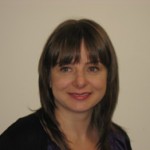 Louise Connelly, Ph.D., currently works as an Online Learning Advisor for the Institute for Academic Development at the University of Edinburgh. She also teaches short-courses in Hinduism and Buddhism through the Office of Lifelong Learning at the University of Edinburgh. Her Ph.D. thesis is titled “Aspects of the Self: An analysis of self reflection, self presentation and the experiential self within selected Buddhist blogs” (University of Edinburgh). Her research interests include early Buddhism, visual culture, the use of social media, and Buddhist ritual and identity in the online world of Second Life. Her recent publications include ‘Virtual Buddhism: An analysis of aesthetics in relation to religious practice within Second Life’, Heidelberg Journal of Religions on the Internet (2010); ‘Virtual Buddhism: Buddhist ritual in Second Life’ in Digital Religion: Understanding Religious Practice in New Media Worlds, Campbell (ed.) (2012); and Campbell and Connelly, ‘Religion and the Internet’ in the Encylopedia of Cyber Behavior, Zang (ed.) (2012). See her personal blog or website for a full CV.
Louise Connelly, Ph.D., currently works as an Online Learning Advisor for the Institute for Academic Development at the University of Edinburgh. She also teaches short-courses in Hinduism and Buddhism through the Office of Lifelong Learning at the University of Edinburgh. Her Ph.D. thesis is titled “Aspects of the Self: An analysis of self reflection, self presentation and the experiential self within selected Buddhist blogs” (University of Edinburgh). Her research interests include early Buddhism, visual culture, the use of social media, and Buddhist ritual and identity in the online world of Second Life. Her recent publications include ‘Virtual Buddhism: An analysis of aesthetics in relation to religious practice within Second Life’, Heidelberg Journal of Religions on the Internet (2010); ‘Virtual Buddhism: Buddhist ritual in Second Life’ in Digital Religion: Understanding Religious Practice in New Media Worlds, Campbell (ed.) (2012); and Campbell and Connelly, ‘Religion and the Internet’ in the Encylopedia of Cyber Behavior, Zang (ed.) (2012). See her personal blog or website for a full CV.
"Thanks for Listening"
It was somewhat fitting that this roundtable ends with these sage words from Mr Whitesides. We were very privileged to enjoy Kevin's company during his eventful year in Edinburgh, and look forward to welcoming him back to the Religious Studies Project in the future. We hope you shall join us in wishing him the best for the coming months back at his home in California.
In the picture below, Dr Steven Sutcliffe, Dr Arkotong Longkumer, David Robertson and Kevin himself made some music at a recent University of Edinburgh event. We won't embarrass them by putting up the video though...
Material Religion
The study of religion and materiality is an important and fast-growing sub-discipline in the contemporary Religious Studies scene. According to the editors of the premier journal in this area, the aptly named 'Material Religion', scholars in this area explore how religion happens in material culture — images, devotional and liturgical objects, architecture and sacred space, works of arts, and mass-produced artifacts. No less important than these material forms are the many different practices that put them to work. Ritual, communication, ceremony, instruction, meditation, propaganda, pilgrimage, display, magic, liturgy and interpretation constitute many of the practices whereby religious material culture constructs the worlds of belief.
In this interview with Chris, Professor David Morgan takes the listener on an exciting tour of what this field has to offer, providing his own definition of material religion, and discussing empirical case studies and theoretical insights relating to religion in popular consumer culture, the sacred gaze, space and place, the internet, and more.
This interview was recorded at the Religion and Society Programme's 'Sacred Practices of Everyday Life' Conference in Edinburgh in May 2012, and we are very grateful to all involved for facilitating this discussion. It also forms part of a short series of podcasts on Material/Embodied religion, continuing next week with Marta Tzrebiatowska on "Why are Women more Religious than Men?".
Why are Women more Religious than Men?
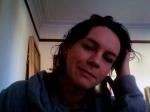 The relationship of religion to gender is a highly complex and disputed area. However, it is well-documented that (to take some UK-based examples), ‘men are proportionately under-represented’ in (mainstream ‘Christian’) ‘religious’ services (Brown 2000, 193), and ‘women outnumber men on all indices of religiosity and spirituality’ (Day 2008, 267). In fact, Marta Trzebiatowska and Steve Bruce, the authors of the forthcoming Why are Women more Religious than Men? (OUP, 20 September 2012) unambiguously state in their abstract that, simply, 'women are more religious than men'.
The relationship of religion to gender is a highly complex and disputed area. However, it is well-documented that (to take some UK-based examples), ‘men are proportionately under-represented’ in (mainstream ‘Christian’) ‘religious’ services (Brown 2000, 193), and ‘women outnumber men on all indices of religiosity and spirituality’ (Day 2008, 267). In fact, Marta Trzebiatowska and Steve Bruce, the authors of the forthcoming Why are Women more Religious than Men? (OUP, 20 September 2012) unambiguously state in their abstract that, simply, 'women are more religious than men'.
In this interview with Chris, recorded at the BSA's Sociology of Religion Study Group Conference in March 2012, Dr Marta Trzebiatowska us a fascinating whirlwind tour through the masses of sociological research which have been done into this area in recent years.
You can also download this interview, and subscribe to receive our weekly podcast, on iTunes. And please, take moment to rate us.
Explanations for this disparity in levels of religiosity include suggestions that ‘religion’ emphasises ‘‘feminine’ qualities of relationality and emotional expression’ (Aune and Vincett 2010, 222), and that ‘men tend to exhibit a greater degree of skepticism than do women’ (Bryant 2007, 844). It has been proposed that women explain their ‘religious’ experiences ‘in terms of protection [and] belonging’ (Day 2008, 274) and ‘value being caring and expressive, being a person through reciprocal relationships, and appreciate the value of improving the quality of subjective-life [in contrast to men, who concentrate] on improving the quality of life by way of autonomous, individuated and competitive agency in the world’ (Heelas et al. 2005, 110). Trzebiatowska extensively examines and critiques such explanations and concludes, with Bruce, that
the gender gap is not the result of biology but is rather the consequence of important social differences —responsibility for managing birth, child-rearing and death, for example, and attitudes to the body, illness and health — over-lapping and reinforcing each other. In the West, the gender gap is exaggerated because the social changes that undermined the plausibility of religion bore most heavily on men first. Where the lives of men and women become more similar, and where religious indifference grows, the gender gap gradually disappears.
For discussions on these issues and more, we recommend that you check out Marta's other work, the references cited in this post, and the recently launched (2011) online journal previous interview with Lisbeth Mikaelsson on Religion and Gender.
Dr Marta Trzebiatowska is Lecturer in the Department of Sociology at the University of Aberdeen. Her research focuses on 'taking religion seriously' and on the relationship between religious discourses and gender politics. More specifically, she focuses on sociologically examining the ways in which religious women construct their femininity under circumstances commonly perceived as restrictive, or even oppressive, by secular feminists. She is the author of a number of articles and chapters in these areas, including Habit does not a nun make?: Religious dress in the lives of Polish Catholic nuns (Journal of Contemporary Religion) and When Reflexivity is Not Enough: Researching Polish Catholics (Fieldwork in Religion), and is co-author, with Steve Bruce, of the OUP Book Why are Women more Religious than Men? (2012).
This interview is the second in our series on Material/Embodied Religion, which started last week with David Morgan on Material Religion, and concludes next week with Professor Kim Knott on Religion, Space and Location.
References:
- Aune, Kristin, and Giselle Vincett. “Gender Matters: Doing Feminist Research on Religion and Youth.” In Religion and Youth, edited by Sylvia Collins-Mayo and Pink Dandelion, 217–224. Surrey: Ashgate, 2010.
- Bryant, Alyssa N. “Gender Differences in Spiritual Development During the College Years.” Sex Roles 56 (2007): 835–846.
- Day, Abby. “Wilfully Disempowered.” European Journal of Women’s Studies 15, no. 3 (2008): 261 –276.
- Heelas, Paul, Linda Woodhead, Benjamin Seel, Bronislaw Szerszynski, and Karen Tusting. The Spiritual Revolution: Why Religion Is Giving Way to Spirituality. Oxford: Blackwell, 2005.
Religion, Space and Locality
Over the past decade or so, the academic study of religion has become infused with a (re-)appreciation of 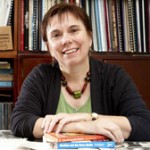 the importance and impact of space, place and location upon its field of study. Of course, scholars have for a long time been aware of the need to situate ‘religion’ in context, however, the spatial analysis goes far beyond mere description of physical or cultural spaces, attending to the materiality and embodiment of ‘religious’ actions, thoughts, feelings, expressions etc and the reciprocity between individuals and the many different physical, social, intellectual, emotional, historical etc spaces in which they move.
the importance and impact of space, place and location upon its field of study. Of course, scholars have for a long time been aware of the need to situate ‘religion’ in context, however, the spatial analysis goes far beyond mere description of physical or cultural spaces, attending to the materiality and embodiment of ‘religious’ actions, thoughts, feelings, expressions etc and the reciprocity between individuals and the many different physical, social, intellectual, emotional, historical etc spaces in which they move.
At a basic level, we can all think of obvious examples of formalised sacred spaces - but what about the religious character of ostensibly secular locations such as street corners, restaurants, or university campuses? What has been the effect of the development of, and engagement with, the internet? What about physical spaces which are transitory in nature, such as shared or multi-faith worship spaces, airport prayer rooms, or sports halls? What are the effects of our own bodies and the embodiment of others? What are the spatial properties of extension through time and across the globe? In this podcast, Chris is joined by Professor Kim Knott, Professor of Religious and Secular Studies at Lancaster University, and author of The Location of Religion: A Spatial Analysis (2005), to discuss these questions, to present the methodology she developed to attempt to tackle such questions, to give practical examples of this methodology in a number of different contexts, and much more. In fact, the air conditioner in the room where this interview was recorded acts as a prime example of the impact that a ‘space’ can have...
You can also download this interview, and subscribe to receive our weekly podcast, on iTunes. And please, take moment to rate us.
In the conclusion of her recent article in the journal Religion (2009), Knott asks ‘What are the scholarly merits of studying religion in local perspective?’ She replies:
An examination of specific places (whether physical, social or discursive) and localised religious groups, places and activities challenges the conception of ‘World Religions’ as unities focused on discrete, systematic sets of traditions, and normative beliefs and practices. In fact, it is possible that some religious people and organisations forged in particular localities become more interconnected and akin to each other than they are to those at a distance with whom they share a formal religious identity. [...]
Studying religion in locality also signals a move away from the modernist regime of collecting, classifying and comparing data towards seeing religion as a plural, dynamic and engaged part of a complex social environment or habitat that is globally interconnected and suffused with power. Re-engaging it with what has traditionally been seen as its ‘context’ helps us to reconnect ‘religion’ with those other categories – ‘society’, ‘politics’ and ‘economics’ – from which has been separated for the purpose of classification and study (Fitzgerald, 2007). In focusing intensively on particular bodies, objects, groups or places, we begin to see the difficulty and erroneousness of distinguishing ‘religion’ from other social fields in order to investigate it without meaningful reference to its context. Such an act of scholarly reconnection inevitably requires a multidisciplinary and polymethodic process that brings a researcher into engagement with others within and beyond the study of religions who approach the study of that body, object, group or place and what goes on within it from sociological, geographical, cultural, historical, anthropological and economic perspectives using a variety of fieldwork and textual methods. (2009, 159)
Kim Knott is Professor of Religious and Secular Studies at Lancaster University. She works on contemporary religion and the ‘secular sacred’, and their interrelationship. She developed a spatial methodology in Jolyon Mitchell, in L Woodhead and R Catto (eds), Religion and Change in Modern Britain (2012). She participates in a large programme of research on 'Religion and Diversity', funded by the SSHRC in Canada and hosted at the University of Ottawa, and has been an international advisor in international projects on 'The Religious Lives of Migrant Minorities', 'Religious Pluralisation in Europe', 'Living with Difference', and 'Multi-Faith Spaces'. She has been on working groups, commissioning panels and advisory boards for several UK research council research programmes: 'Religion and Society', 'New Security Challenges: Radicalisation - A Critical Reassessment', and 'Connected Communities'. She is currently on the editorial boards of the journals Religion, South Asian Diaspora, Journal of Contemporary Religion and Fieldwork in Religion and was General Secretary of the European Association for the Study of Religion (2005-10) and President of the British Association for the Study of Religions in the 1990s. A full bibloography and more information can be found on her departmental web page.
[From 1 October 2012 she will also be Chris’s supervisor when he begins his PhD in Religious Studies at Lancaster University]
This interview was recorded at the Why are Women more Religious than Men?” and David Morgan on Material Religion.
References:
- Knott, K. 2009, 'From locality to location and back again: A spatial journey in the study of religion', Religion, 39:2, 154-60.
Digital Religion
 Second Life, World of Warcraft, over the past few years the internet has seen an explosion of activity in virtual realms. People have taken to creating digital avatars whether its to join in epic fantasy battles or simply to meet other people. And where you find people meeting you're bound to find religion in the mix. Unlike chatrooms and blog posts where people simply write out their ideas and discuss their beliefs these digital worlds offer a whole new way in which to act out and practice religious beliefs. From meditation sessions, church congregations, to memorial services the range of activities not only matches what can be found in the real world but can exceed it also. The Digital realm opens up a whole new range of possibilities for a person to be religious.
Second Life, World of Warcraft, over the past few years the internet has seen an explosion of activity in virtual realms. People have taken to creating digital avatars whether its to join in epic fantasy battles or simply to meet other people. And where you find people meeting you're bound to find religion in the mix. Unlike chatrooms and blog posts where people simply write out their ideas and discuss their beliefs these digital worlds offer a whole new way in which to act out and practice religious beliefs. From meditation sessions, church congregations, to memorial services the range of activities not only matches what can be found in the real world but can exceed it also. The Digital realm opens up a whole new range of possibilities for a person to be religious.
For many of us in the study of religions this may seem like a daunting task. The digital realm is a dark continent in which the standard practices of methodology and theory find themselves tested by a whole new landscape. To introduce us to the vast array of topics Tim Hutchings provides us with an introductory discussion into the world of digital religion. We discuss the ways in which religion is finding itself in the digital realm and how this new format of expression differs from its real world iterations. The digital realm poses a number of interesting challenges to the questions of religious authority and orthodoxy in ways not visible/possible in the real world. Finally we tackle some of the issues that we as researchers must face when we try and study digital religion like the methods of data collection and ethics involved in studying digital avatars.
You can also download this interview, and subscribe to our weekly podcast, on iTunes. And if you enjoyed it, please take a moment to rate us.
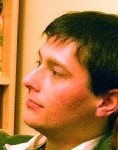 Tim Hutchings recently completed a postdoctoral fellowship at the HUMlab digital humanities centre in Umeå, Sweden and has now returned to the UK to join the CODEC research initiative at St John’s College, Durham. Tim is currently working with CODEC to develop a series of digital art exhibitions and installations in response to the Lindisfarne Gospels. His PhD thesis (Durham University, 2010) was an ethnographic study of five online Christian churches, focusing on the relationship between online and offline religion. Research interests include e-vangelism, online Christian storytelling, the future of the Bible as a digital sacred text and the role of new media in death and mourning. Tim has also written for us before responding to Callum Brown, you can find his article which also discusses Digital Religion here.
Tim Hutchings recently completed a postdoctoral fellowship at the HUMlab digital humanities centre in Umeå, Sweden and has now returned to the UK to join the CODEC research initiative at St John’s College, Durham. Tim is currently working with CODEC to develop a series of digital art exhibitions and installations in response to the Lindisfarne Gospels. His PhD thesis (Durham University, 2010) was an ethnographic study of five online Christian churches, focusing on the relationship between online and offline religion. Research interests include e-vangelism, online Christian storytelling, the future of the Bible as a digital sacred text and the role of new media in death and mourning. Tim has also written for us before responding to Callum Brown, you can find his article which also discusses Digital Religion here.

